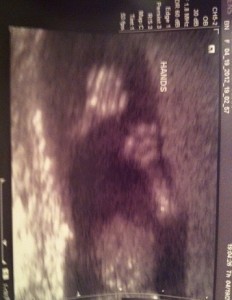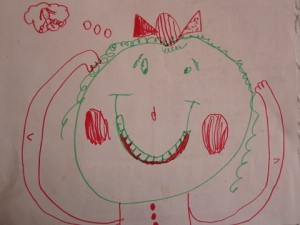These are the developing hands of a 14 weeks-along baby, Birgitta’s little him-or-her. During the ultrasound picture-taking session, this tiny child whose hands had been against his/her cheeks for the first photos suddenly reached toward the camera, fingers splayed, as if to say, “Mama! Look what I have!”
Birgitta said that when these miniature hands flashed on the screen she began giggling so hard the baby joined in on the fun with an enthusiastic wiggle-dance. I like to think it was God’s uncontainable joy bubbling within Birgitta and flooding into her little one.
Being allowed to take a peek at what the Creator is doing inside my daughter’s womb is to get a glimpse of the wonder that God is. It was his idea to design hands as he did, making them useful tools we usually take for granted.
Hands are pretty remarkable. They’re flexible but can be stiffened to hold up something heavy. They can swing a hammer with force or caress a loved one with gentleness. Hands can shake each other in greeting or lend-a-hand as needed. They can cheer someone by clapping approval or reach toward heaven in prayer.
When God gave us hands, he also provided a hand-book. Scripture cautions us to be careful with our hands, to use them as he instructs. Jesus used his hands to touch the untouchable, the diseased, the contaminated. And he allowed his hands to be nailed to a cross for our benefit. One day we’ll get to see evidence of that when he shows us his hands and the scars he wears.
But what are regular people supposed to do with their hands? Birgitta’s child has hands that can’t do much of anything right now, though they’ve already gifted a young mama with joy. One day, though, they may play the piano or paint a picture. Maybe they’ll mold clay or repair computers, perform surgery, write books. We don’t know, but the Lord does, so he’ll help Birgitta coax her little one in the right direction.
But what about the rest of us? In response to God’s profound love, we ought to follow his hand-book to a T. It says we should “do good… be rich in good deeds… generous and willing to share.” (1 Timothy 6:18) He gave us hands to facilitate accomplishing this, and even told us how to handle those deeds: “Whatever your hand finds to do, do it with all your might.” (Ecclesiastes 9:10)
In October our family will get to touch the dimpled, feather-soft hands of a new baby. We may just all start giggling in a fresh outburst of joy at what God has done.
“Can a mother… feel no love for the child she has borne? But even if that were possible, I would not forget you! See, I have written your name on the palms of my hands.” (Isaiah 49:15-16)







